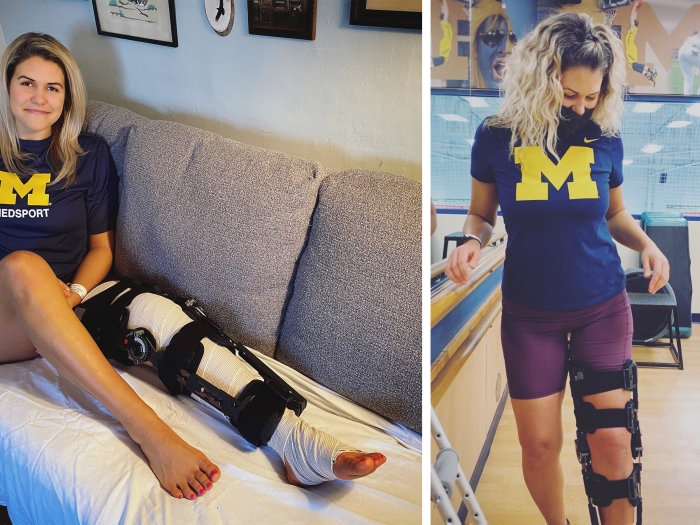A new research report shows an increase in patients being prescribed opioids after experiencing an ankle sprain. The Michigan Medicine authors urge fellow physicians to be aware of the current treatment guidelines.
7:49 AM
Author |

While ankle sprain injuries are common, a new report from Michigan Medicine suggests that the rate of opioids prescribed to those patients have become uncommonly high.
LISTEN UP: Add the new Michigan Medicine News Break to your Alexa-enabled device, or subscribe to our daily updates on iTunes, Google Play and Stitcher.
"The opioid epidemic is well documented in this country," says James R. Holmes, M.D., service chief of foot and ankle, and an associate professor of orthopaedic surgery at Michigan Medicine.
"Physician prescribing and over-prescribing is part of the problem."
Holmes is the senior author on a new brief research report, published in Annals of Internal Medicine, that examined the rates of opioids prescribed to patients who experienced an ankle sprain injury.
The research team examined data from a health insurance claims database and found that of the nearly 592,000 patients diagnosed with an ankle sprain during the selected nine-year period, 11.9 percent filled an opioid prescription within seven days of diagnosis.
No evidence-based treatment guidelines for ankle sprains include prescribing opioids.James R. Holmes, M.D.
"When we selected out opioid-naïve individuals, or individuals who had not had an opioid prescription during the year before the sprain, 8.4 percent of these individuals were still filling a prescription for an opioid three months after the original diagnosis," Holmes says.
Treatment guidelines
Even more alarming, Holmes says that opioids have never been included in treatment recommendations for ankle sprains.
"Several evidence-based recommendations for the treatment of ankle sprains exist and include treatments such as cryotherapy, nonsteroidal anti-inflammatory drugs, functional support and exercise," he says.
MORE FROM MICHIGAN: Sign up for our weekly newsletter
"No evidence-based treatment guidelines for ankle sprains include prescribing opioids."
The study notes that most prescriptions were provided by physicians and advanced practice providers in emergency medicine and primary care settings.
"A recent study showed that approximately 25 percent of patients with ankle sprains presenting to hospital emergency departments received an opioid prescription," Holmes says.
"It's important for all physicians to understand ankle sprain treatment guidelines and the fact that initial opioid prescription seems to be linked to new persistent opioid use: in this particular study, 8.4 percent of individuals."
The study team collaborated extensively with co-authors Chad Brummett, M.D., Jennifer Waljee, M.D., M.P.H., and the Michigan Opioid Prescribing Engagement Network (Michigan OPEN). To learn more about the network, please visit its website.

Explore a variety of healthcare news & stories by visiting the Health Lab home page for more articles.

Department of Communication at Michigan Medicine
Want top health & research news weekly? Sign up for Health Lab’s newsletters today!





